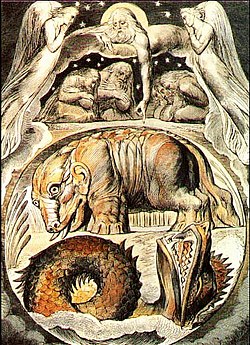leviathan
Appearance
English
[edit]
Alternative forms
[edit]Etymology
[edit]From Middle English levyethan, levyathan, etc., from Late Latin leviathan, a transliteration of Biblical Hebrew לִוְיָתָן (liv'yatán).
Pronunciation
[edit]Noun
[edit]leviathan (plural leviathans)
- (biblical, mythology) A vast sea monster of tremendous strength, described as the most powerful and dangerous creature in the ocean.
- 1611, The Holy Bible, […] (King James Version), London: […] Robert Barker, […], →OCLC, Job 41:1, column 1:
- Canſt thou dravv out Leuiathan vvith an hooke? or his tongue vvith a corde vvhich thou letteſt dovvne?
- 1904, Jack London, chapter 1, in The Sea-Wolf (Macmillan’s Standard Library), New York, N.Y.: Grosset & Dunlap, →OCLC:
- The fog seemed to break away as though split by a wedge, and the bow of a steamboat emerged, trailing fog-wreaths on either side like seaweed on the snout of Leviathan.
- (figuratively) Something monstrously large or mighty in size, strength, wealth, etc.
- 1840 April – 1841 November, Charles Dickens, “Chapter the Twenty-seventh”, in The Old Curiosity Shop. A Tale. […], volume I, London: Chapman and Hall, […], published 1841, →OCLC:
- When she had exhibited these leviathans of public announcement to the astonished child, she brought forth specimens of the lesser fry in the shape of hand-bills, some of which were couched in the form of parodies on popular melodies, […]
- 1855 January 5, Anthony Trollope, “The Warden’s Decision”, in The Warden, London: Longman, Brown, Green, and Longmans, →OCLC, page 200:
- It [a newspaper article] named some sons of bishops, and grandsons of archbishops; men great in their way, who had redeemed their disgrace in the eyes of many by the enormity of their plunder; and then, having disposed of these leviathans, it descended to Mr Harding.
- 1895–1897, H[erbert] G[eorge] Wells, “The ‘Thunder Child’”, in The War of the Worlds, London: William Heinemann, published 1898, →OCLC, (please specify the page number(s)):
- Keeping his footing on the heaving deck by clutching the bulwarks, my brother looked past this charging leviathan at the Martians again, and he saw the three of them now close together, and standing so far out to sea that their tripod supports were almost entirely submerged. Thus sunken, and seen in remote perspective, they appeared far less formidable than the huge iron bulk in whose wake the steamer was pitching so helplessly.
- 2020 October 7, Cecilia D'Anastasio, “Amazon Wants to ‘Win at Games.’ So Why Hasn’t It?”, in Wired[1]:
- After brute-forcing its way to dominance in so many industries, the tech leviathan may finally have met its match.
- (political science, sometimes capitalized) The political state, especially a domineering and totalitarian one as theorized by Thomas Hobbes.
- 1951, Hannah Arendt, “The Political Emancipation of the Bourgeoisie”, in The Origins of Totalitarianism (A Harvest/HBJ Book), new edition, San Diego, Calif., New York, N.Y.: Harcourt Brace Jovanovich, published 1973, →ISBN, part 2 (Imperialism), page 140:
- The fact is that [Thomas] Hobbes is interested in neither, but concerned exclusively with the political structure itself, and he depicts the features of man according to the needs of the Leviathan.
Descendants
[edit]- → Translingual: †Leviathan
Translations
[edit]Biblical sea monster
|
Adjective
[edit]leviathan (not comparable)
- Very large; gargantuan.
- Synonyms: enormous, giant, ginormous; see also Thesaurus:large
- 1961 November 10, Joseph Heller, “The Soldier in White”, in Catch-22 […], New York, N.Y.: Simon and Schuster, →OCLC, page 171:
- Her virtuous, pale-blue, saucerlike eyes flooded with leviathan tears on unexpected occasions and made Yossarian mad.
Translations
[edit]very large; gargantuan
|
Further reading
[edit] leviathan on Wikipedia.Wikipedia
leviathan on Wikipedia.Wikipedia  Leviathan (Hobbes book) on Wikipedia.Wikipedia
Leviathan (Hobbes book) on Wikipedia.Wikipedia
Categories:
- English terms inherited from Middle English
- English terms derived from Middle English
- English terms derived from Late Latin
- English terms derived from Biblical Hebrew
- English 4-syllable words
- English terms with IPA pronunciation
- English terms with audio pronunciation
- Rhymes:English/aɪəθən
- Rhymes:English/aɪəθən/4 syllables
- English lemmas
- English nouns
- English countable nouns
- en:Bible
- en:Mythological creatures
- English terms with quotations
- en:Political science
- English adjectives
- English uncomparable adjectives
